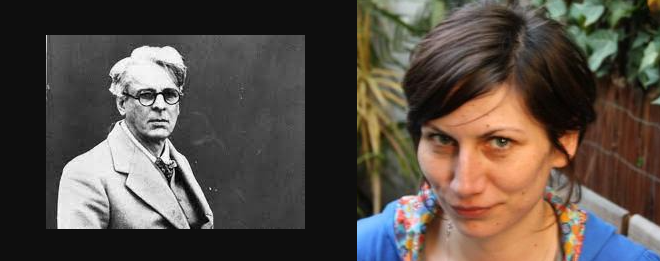
Hello, everyone.
Aleksandra Lane lives in Wellington, New Zealand. Her first book of poetry was published in 2012.
William Butler Yeats died at the age of 73 in 1939. Widely acclaimed in his native Ireland and abroad, he won the Nobel Prize for Literature in 1923.
Although both poems are entitled Easter, neither of them directly addresses that topic.
The themes of both poems, rather than renewal and rebirth, are loss and death.
Try to write about one subject, while in fact addressing the opposite.
The structure of the first poem is more brief, while the second is more long.
Try to choose a rough length for your poem before you begin.
The second poem relates directly to an important day in history.
Choose a day from history and write on that if you like.
Six words to attempt to incorporate into your writing from Lane: blue, sunny, win, stubborn, windows, wide.
Six words from Yeats: polite, certain, other, song, murmur, know.
If you have a copy of The Exercise Book (Manhire, Duncum, Price & Wilkins), turn to page "#165: Wife Swap" for an additional challenge.
That's all. I hope you are inspired to write today.
Easter
by Aleksandra Lane
Each of us chooses an egg.
Uncle who has just passed away
gets the blue.
My first cousin wraps herself around
her sunny child. Yellow.
The boy next door brings a wooden one.
(We let him win for a while.)
My mother picks the most stubborn of the lot,
one that remains intact when all the others
are crushed and crumbed into saffron yolk.
The late uncle sneezes and we close all
the windows.
I tell you April has wide nostrils
and a touch of hay fever.
Easter, 1916
by William Butler Yeats
I have met them at close of day
Coming with vivid faces
From counter or desk among grey
Eighteenth-century houses.
I have passed with a nod of the head
Or polite meaningless words,
Or have lingered awhile and said
Polite meaningless words,
And thought before I had done
Of a mocking tale or a gibe
To please a companion
Around the fire at the club,
Being certain that they and I
But lived where motley is worn:
All changed, changed utterly:
A terrible beauty is born.
That woman's days were spent
In ignorant good-will,
Her nights in argument
Until her voice grew shrill.
What voice more sweet than hers
When, young and beautiful,
She rode to harriers?
This man had kept a school
And rode our wingèd horse;
This other his helper and friend
Was coming into his force;
He might have won fame in the end,
So sensitive his nature seemed,
So daring and sweet his thought.
This other man I had dreamed
A drunken, vainglorious lout.
He had done most bitter wrong
To some who are near my heart,
Yet I number him in the song;
He, too, has resigned his part
In the casual comedy;
He, too, has been changed in his turn,
Transformed utterly:
A terrible beauty is born.
Hearts with one purpose alone
Through summer and winter seem
Enchanted to a stone
To trouble the living stream.
The horse that comes from the road,
The rider, the birds that range
From cloud to tumbling cloud,
Minute by minute they change;
A shadow of cloud on the stream
Changes minute by minute;
A horse-hoof slides on the brim,
And a horse plashes within it;
The long-legged moor-hens dive,
And hens to moor-cocks call;
Minute by minute they live:
The stone's in the midst of all.
Too long a sacrifice
Can make a stone of the heart.
O when may it suffice?
That is Heaven's part, our part
To murmur name upon name,
As a mother names her child
When sleep at last has come
On limbs that had run wild.
What is it but nightfall?
No, no, not night but death;
Was it needless death after all?
For England may keep faith
For all that is done and said.
We know their dream; enough
To know they dreamed and are dead;
And what if excess of love
Bewildered them till they died?
I write it out in a verse—
MacDonagh and MacBride
And Connolly and Pearse
Now and in time to be,
Wherever green is worn,
Are changed, changed utterly:
A terrible beauty is born.
(September 25, 1916)